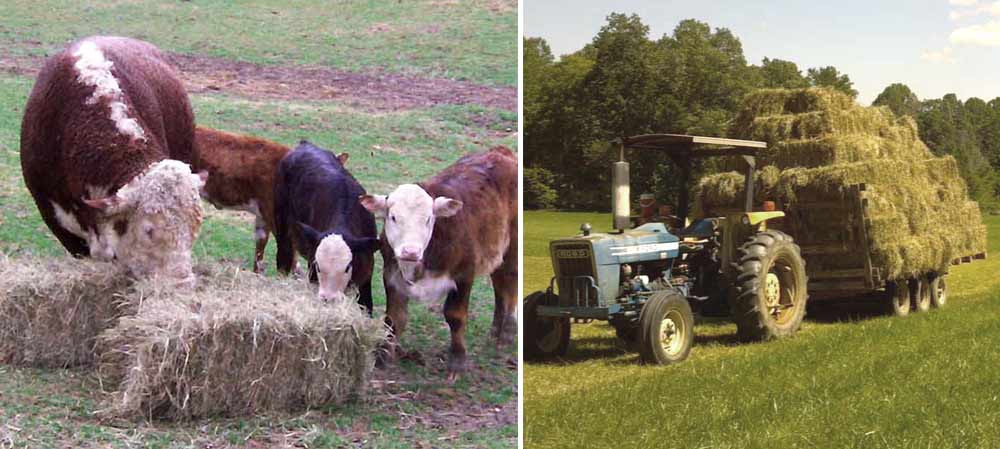
What do cows eat?
Cows are herbivores. They eat grass, grains, vegetables, fruits, leaves, litchen, bark, and twigs. Grass is a cow’s main diet. They eat lots of green grass and bales of hay (dried grass). A lot of farmers feed their cattle fermented grains known as silage, but we haven't done that in years.
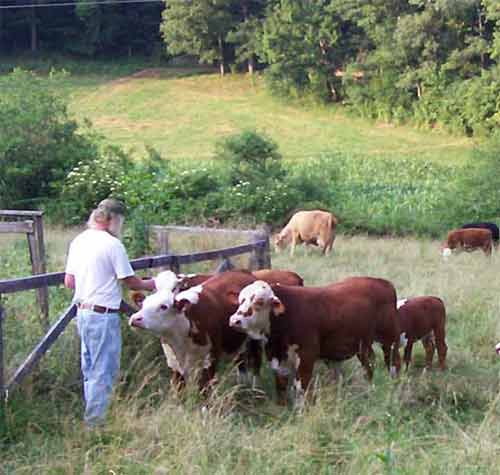
Cows also love sweet feed, oats, wheat, cottonseed meal, corn, and alfalfa. To a cow, these foods are like candy. They gobble it up by the bucket full.
Cattle must have plenty of grass.
"Grass-fed cattle” spend most of their time grazing in the pastures picking grass.
All of our cows are free to roam in the pastures. They also have access to woods and a fast-running creek.
We never pen our cows up unless we are fattening one for the butcher. We might also put up a cow that needs medical treatment, which is a very rare thing for us.
I will not go into feed-lot practices since that is not how we do things on Payne Mountain Farms.
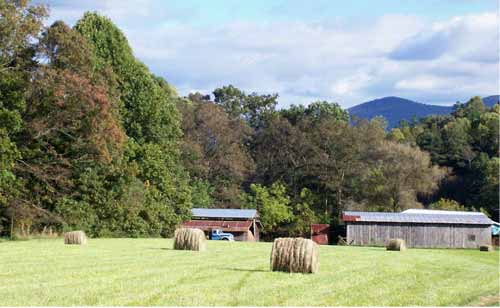
Cows like a variety of food.
Our cows eat all kinds of good stuff. Acorns, tree bark, green twigs, tree leaves, herbs, pine cones, pine needles, blackberries, clover, and grass. When they are in the woods, they munch on all kinds of natural foods.
We supplement what they find while grazing with bags of feed from the farm supply stores. We look for organic feed, but sometimes go by look and smell when deciding what to buy. The best feed is whole grain (not pellets) and has a nice aroma with no sign of mold.
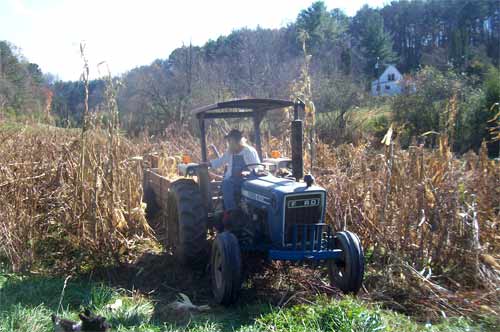
Cows also like treats.
Cows love carrots, apples, watermelon rind, pumpkins, corn on the cob, corn shucks, molasses, honey, and other sweet fruits. Some cows, especially Brahmas, even eat overgrown squash and cucumbers.
When Tony harvests the corn, our cows line up along the fence hoping for a bite. They come running when we throw vegetables over the fence. I have seen them nudge each other out of the way to get to a tasty morsel.
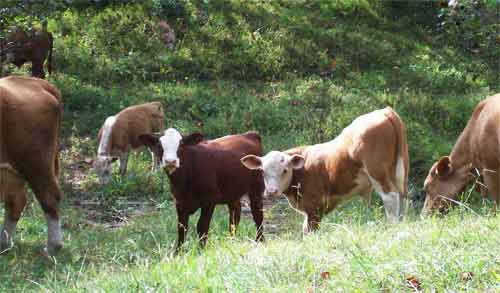
Extra nutrition and care
Our cows also get trace-minerals and salt blocks several times a year. They lick the blocks to get extra nutrients. The cows also get wormer blocks as needed. So far, we have never had to give them antibiotics or other medicines.
Video from Payne Mountain Farms
Here is a short video that shows the cows, their food, and favorite treats.
Cows have different tastes and personalities.
Some breeds of cows are pickier than others. A Brahma will eat saw-briars but a Hereford won’t.
Some cows have a yearning for a particular plant. We used to have a Jersey cow that loved clover. She would break out of the pasture to get to the clover growing in the yard.
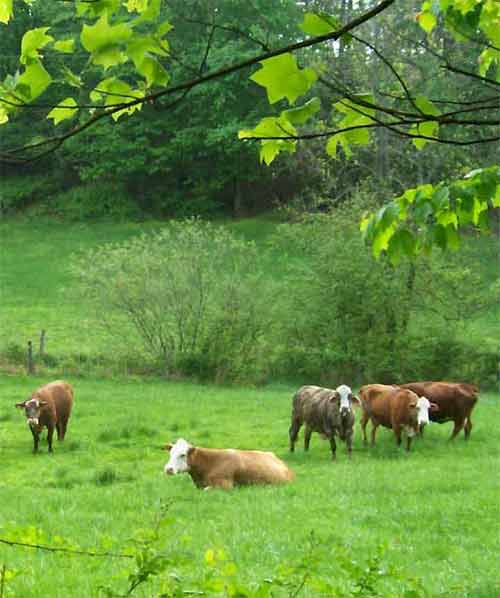
Use caution when feeding cows.
Cows will also eat too much of a good thing, which can cause bloating. Usually caused by human ignorance, bloating is a serious problems in cows.
A little won’t hurt, but too much cabbage (or any of the brassicas) causes bloating. Bloating is an emergency and can lead to death. Too much silage, corn, or grain can also cause bloating and diarrhea.
A little sorghum is great for cows, but a large amount is not. A sugar cube is a treat, but a bucket full of sugar is dangerous! Use caution and common sense when giving anything unusual to livestock.
Toxic plants
Some things are highly toxic to cows including potato vines, onions, avocado peelings, cherry tree leaves, and chocolate. Find more information about foods that are poisonous to cows at the Open Sanctuary Project.
Also beware of products containing herbicides or pesticides. These can harm all living creatures. I am thankful that we grow our own vegetables so the cows can have the leftovers. I am also glad we grow our own hay. If you are purchasing hay for your livestock, be sure to buy the best you can afford.
Thanks for reading my blog. Jan.
Back to list of blog posts
To purchase heirloom corn seed, yellowroot, and other herbs, visit Every Green Herb (our herbal encyclopedia and online store).
Contact us by email at hometown30512@yahoo.com
Payne Mountain Farms
322 EV Farm Dr.
Blairsville, GA 30512 USA
This post contains original photos, text, and other content by Janice Boling. If stock photos are used, credits are given. Sources are also listed when applicable.
© 2010 - 2023 by Janice Boling